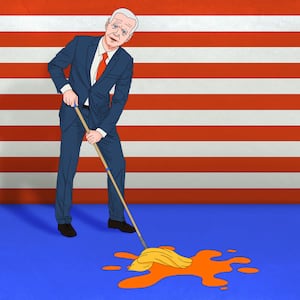Speaking from the West Front of the Capitol after a violent insurrection claimed five lives there on Jan. 6, President Joe Biden sought to comfort a distressed country still suffering from the strife of simultaneous national calamities.
Biden’s earliest words as president offered Americans direct reassurance that the most fundamental component of the nation’s government was still intact.
“This is democracy’s day,” he said, minutes after being sworn into office by Supreme Court Chief Justice John Roberts as the 46th president of the United States. “A day of history and hope, of renewal and resolve. Through a crucible for the ages America has been tested anew, and America has risen to the challenge.”
“The people,” he continued, “the will of the people, has been heard, and the will of the people has been heeded. We’ve learned again that democracy is precious. Democracy is fragile. And at this hour, my friends, democracy has prevailed.”
Biden, 78, addressed two threats that have worsened under President Donald Trump’s administration, the unchecked coronavirus pandemic and the growing presence of terrorism at home—which only two weeks ago arrived at the very platform from which Biden spoke. Standing resolutely, his jacket pinned with a small American flag on a chilly Wednesday afternoon, the president championed the “restless, bold, optimistic” collective pursuit of restoring what has been lost.
“A cry for survival comes from the planet itself,” Biden said. “A cry that can't be any more desperate or any more clear, and now arise political extremism, white supremacy, domestic terrorism that we must confront and we will defeat.”
In an acknowledgment of the still bitterly divided national political climate—which is expected to continue long after Biden’s first few days in office—he called on citizens to help de-escalate the rampant partisanship.
“We must end this uncivil war that pits red against blue, rural versus urban, conservative versus liberal,” he said. “We can do this if we open our souls instead of hardening our hearts, if we show a little tolerance and humility, and if we're willing to stand in the other person's shoes as my mom would say, just for a moment, stand in their shoes.”
Throughout his 20-minute address, Biden also provided a positive outlook for the nation’s future, seeking to remind viewers that, despite strife, sadness, and anger, his administration will offer a unified approach. He pledged to pen a new chapter in the “American story.”
A significant part of that book includes a historic start. “Today we mark the swearing in of the first woman in American history elected to national office, Vice President Kamala Harris. Don't tell me things can’t change,” Biden said, beaming with pride for his number 2, who was sworn in by Supreme Court Justice Sonia Sotomayor.
“My whole soul is in it,” Biden said. “Today, on this January day, my whole soul is in this, bringing America together, uniting our people, uniting our nation. And I ask every American to join me in this cause,” he continued, to applause, listing off the “foes” he plans to combat: “Anger, resentment and hatred, extremism, lawlessness, violence, disease, joblessness, and hopelessness.”
“America is once again the leading force for good in the world,” he said.
The mood ahead of Biden’s address, despite the best efforts of the U.S. Marine Corps Band’s Sousa-heavy setlist, was somber. As grandees of the House and Senate leadership were introduced by an announcer over a loudspeaker, almost no applause could be heard for any of them; at the conclusion of every song, little could be heard on the lawn in front of the platform aside from the thrum of helicopters protecting the airspace.
And while the evidence of the insurrection was largely removed from the exterior of the Capitol, the consequences of that day were everywhere—including on the shattered glass door that Biden used to enter the Capitol.
In the hours leading up to the day’s festivities, the streets around the Capitol were largely empty of people, save for scattered law enforcement, military, and press. Gawkers from the Capitol Hill neighborhood briskly passed by the security perimeter on 1st St. NE, a block away from the Senate office buildings. On the corner of Massachusetts Ave., a Finnish journalist desperately searched for someone, anyone, to interview—and lamented that she had only found other journalists.
Outside the Hart Senate Office Building, roughly 30 armed National Guardsmen patrolled an opening in the gated barbed-wire. Inside, spare supply rooms in the building’s basement had been converted into areas for them to rest. The starkness of the scene weighed on notable guests: an emotional Gov. Tom Wolf (D-PA) told reporters he was saddened on what is typically a bright day for the country. “It’s a military camp,” said Wolf.
As guests gathered on the West Front, the quiet from the reduced attendance, first due to the pandemic, then to security concerns, was so stark that every time the Marine Corps band stopped playing, the only noise was the whistle of the wind. Inside the Capitol, the top four congressional leaders and their spouses waited at the East Front doors of the Capitol—the same doors that had been broken into just two weeks earlier by insurrectionists—for Biden and Harris to arrive. For a moment, Speaker Nancy Pelosi (D-CA) chatted with Elaine Chao, the outgoing Transportation Secretary and wife of Senate Minority Leader Mitch McConnell (R-KY), who stood by them silently.
Just after 10:30, Biden, Harris, and their entourage arrived, walking up the East Front steps and passing through the doors, the shattered glass from the attack a stark reminder of the challenges ahead.
After Biden’s speech concluded, country singer Garth Brooks stepped forward to sing “Amazing Grace,” a song that Sen. Roy Blunt (R-MO) called both “poetry and prayer.” After singing the first verses himself, Brooks encouraged the small crowd to join him. The mood, though still somber, shifted. Members of Congress, journalists, and Marine Corps officers in dress blues all joined in the hymn.









